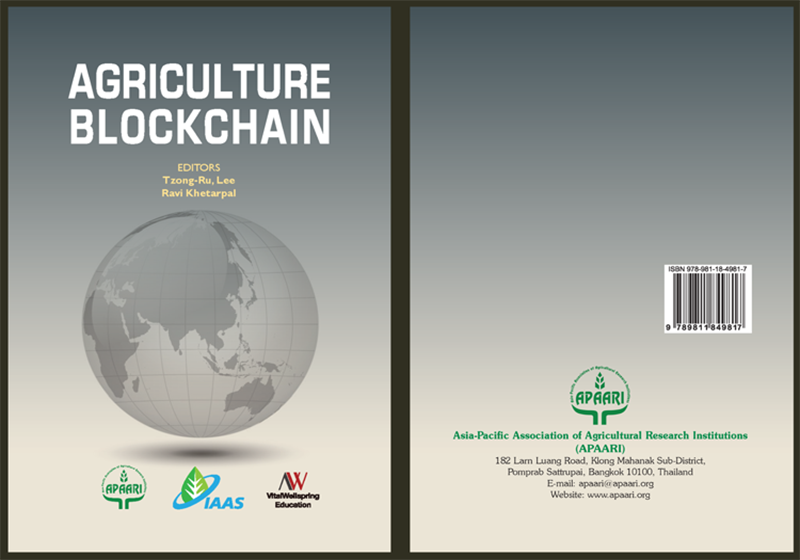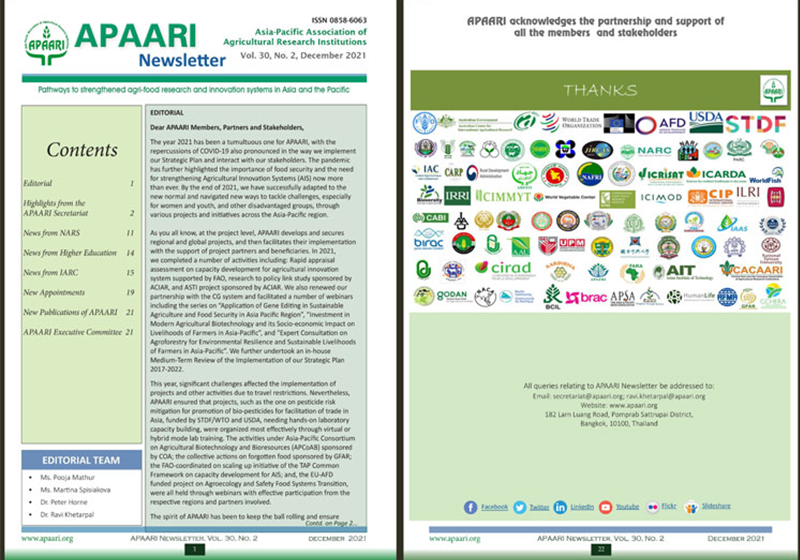Celebration of International Women Day in Asia-Pacific to advance gender equality in innovation
On 8 March 2022, APAARI, APIRAS and TAP collaborated in the celebration of International Women’s Day in Asia-Pacific through a regional webinar on Women in research and extension: Advancing gender quality in innovation. Inspiring women working in agricultural research, extension and policy in Bangladesh, Cambodia, India, Indonesia, Iran, and the Pacific Islands shared their inspiring stories of success, challenges and lessons as innovators and influencers of change in the Asia-Pacific region.
Women’s valuable role in agricultural innovation
For decades, women, including researchers, scientists, rural advisors, research project managers and leaders, but also women producers and agri-entrepreneurs, have been critical players in advancing agricultural transformation of Asia-Pacific through innovation. However, often their valuable contribution to the strengthening of agricultural innovation systems (AIS) may not be fully recognized or utilized. This is mainly due to the patriarchal systems and conservative cultural environments within which they work, as well as their limited capacities, insufficient empowerment to influence innovation processes, lack of mentoring and leadership support, among other factors.
“At times when there are challenges and we feel like giving up, never ever give up because our perspective is bigger than our challenges,” Sailabala Panda, Theme lead, Forest-Based Activities and Livelihoods, PRADAN NGO, Orissa, India
Nevertheless, the role of women in contributing towards food and nutritional security, as well as tackling the impact of COVID-19 and climate change in the region’s agriculture and rural development, can in no way be undermined. There is a general consensus within the Sustainable Development Agenda that “no society can reach its full potential unless it empowers women and youth, and removes all obstacles to women’s full participation in all areas of human endeavours”. As women and men bring different perspectives to problems, women equality needs to be perceived as an enabler of innovation effectiveness.
Agricultural innovation system and key institutions
Agricultural innovation is considered to be the central driving force for achieving a world free from hunger and malnutrition. However, the role of innovation in agricultural research and extension goes beyond technology and is increasingly perceived as a process involving multiple actors working within AIS. National agricultural research and extension system (NARES) working in collaboration with higher education institutions (HEIs), civil society, industry, international agricultural research and regional fora, are key players in promoting innovative solutions for small agricultural producers, small entrepreneurs and the society as a whole. However, despite increasing reforms and openness of the NARES actors away from the linear model of technology transfer and towards the AIS model, these institutions are still embedded in more conservative approaches focused on technological innovation rather than innovative processes involving multi-actors in knowledge co-creation and ensuring gender equality. As such, NARES too require institutional transformation using innovative processes and strategies that strengthen their own individual and organizational capacities, as well as the enabling environment for innovation to happen.
“We, women can do what men can do. So if you want to be innovators, be confidence and you can change the world,” Leli Nuryati, Director, Indonesian Centre for Agricultural Training, Indonesian Agency for Agricultural Extension and Human Resource Development (IAAEHRD), Ministry of Agriculture, Indonesia
To enable such transformation, NARES organizations need to capitalize on female creativity and women’s leadership to push the boundaries of scientific knowledge and find innovative and inclusive ways to solve the region’s complex development challenges. Men are an important part of the innovation process and need to be sensitized on the importance of women empowerment. This can lead to the mindset change required to speed up the progress in innovation through agricultural research and extension. Therefore, efforts to strengthen the enabling environment and institutional capacities for innovation must promote gender equality to support women in realizing their full potential in the strengthening of AIS in their countries and the region.
“When there is resistance or backlash, do not give up and follow your passion. Be with women and men who are supporting you and your agenda,” Flavia Ciribello, Gender and Value Chain Advisor, SPC Land Resources Division (LRD), Pacific Organic and Ethical Trade Community (POETCom), Fiji
The webinar
The webinar on ‘Women in research and extension: Advancing gender equality in innovation’ targeted women and men working in agricultural research, science, and extension in APAARI and APIRAS member institutions. It aimed to inspire and mobilize change to help advance women’s role as innovators in their respective areas of research and extension, to ensure their meaningful and inclusive contribution to the transformation of agri-food systems in the Asia-Pacific region. Specifically, it aimed to:
- Raise awareness on key challenges and opportunities facing women in research and extension in facilitating and contributing to innovation processes in agriculture;
- Share good practices and inspiring stories of women in research and extension in Asia-Pacific;
- Discuss what needs to be done to address the challenges facing women in research and extension across the Asia-Pacific region, and the support they need.
“At institutional level, we really need to practice gender mainstreaming in agriculture innovation,” Tanka Maya Pulami, Deputy Chief Agriculture Officer, Agriculture Research and Development Centre, Department of Agriculture, Ministry of Agriculture and Forests, Bhutan
Following inspiring welcoming statement by Dr. Sasireka Rajendran, Project Manager, APAARI, and Ms. Nimisha Mittal, Lead Researcher, Centre for Research on Innovations and Science Policy (CRISP)/APIRAS, Dr. Norah Omot, Policy Coordinator, APAARI kicked off the meeting. She provided an overview of Asia-Pacific women in research and extension, and their contribution to innovation. The consequent talk show on ‘Making a difference in agricultural innovation in Asia-Pacific – The stories of successful women in research and extension’ provided interesting insights of six women from Asia-Pacific, namely:
- Tanka Maya Pulami, Deputy Chief Agriculture Officer, Agriculture Research and Development Centre, Department of Agriculture, Ministry of Agriculture and Forests, Bhutan
- Sailabala Panda, Theme lead, Forest-Based Activities and Livelihoods, PRADAN NGO, Orissa, India
- Flavia Ciribello, Gender and Value Chain Advisor, SPC Land Resources Division (LRD), Pacific Organic and Ethical Trade Community (POETCom), Fiji
- Leli Nuryati, Director, Indonesian Centre for Agricultural Training, Indonesian Agency for Agricultural Extension and Human Resource Development (IAAEHRD), Ministry of Agriculture, Indonesia
- Maryam Hosseini Chaleshtor, Head of Rice Research Institute of Iran, Agricultural Research, Education and Extension (AREEO), Iran
- Chatnapa Khomarwut, Director, Phrae Agricultural Research and Development Research Center, Office of Agricultural Research and Development Region, Department of Agriculture, Ministry of Agriculture and Cooperatives, Thailand
“Remember how smart and strong you are. It is enough to be determined and believe in yourselves, and you will surely succeed,” Maryam Hosseini Chaleshtor, Head of Rice Research Institute of Iran, Agricultural Research, Education and Extension (AREEO), Iran
“My advice to women is to be open minded, confident, committed and considerate of diverse views,” shared Chatnapa Khomarwut, Director, Phrae Agricultural Research and Development Research Center, Office of Agricultural Research and Development Region, Department of Agriculture, Ministry of Agriculture and Cooperatives, Thailand. “Only then they can link problems with solutions and create self-leadership that will keep their team strong,” she pointed out.



